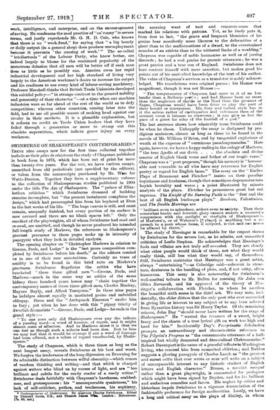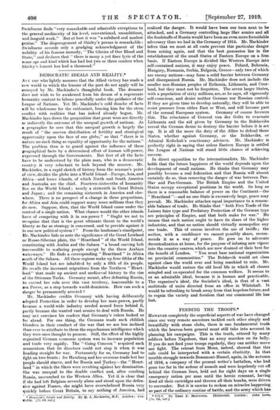SWINBURNE ON SHAKESPEARE'S CONTEMPORARIES.*
THESE nine essays now for the first time collected together include as their pike de resistance the study of Chapman published
in book form in 1875, which has been out of print for more than twenty-five years. For the rest, we have various essays, unearthed from old periodicals (not specified by the editors),
or taken from the manuscripts purchased by Mr. Wise for Watts-Dunton. Together they form a supplementary volume to the collection of Shakespearean studies published in 1908 under the title The Age of Shakespeare. The " palace of Eliza- bethan criticism " which Swinburne dreamed of building
remains incomplete, but " the present instalment completes the design," which had preoccupied him from his boyhood at Eton to the last weeks of his life. The huge canvas is still, and must remain, unequally finished, but every portion of its surface is now covered and there are no blank spaces left." Only the
smallest of the playwrights, all of whom Swinburne had read and re-read,:are omitted, and though he never produced his intended
full-length study of Marlowe, the references to Shakespeare's greatest precursor in these pages make up in intensity of panegyric what they lack in detailed analysis.
The opening chapter on " Christopher Marlowe in relation to. Greene, Peele, and Lodge" is the "last prose composition com- pleted by Swinburue before his death," as the editors remind us in one of their rare annotations. Certainly no trace of senility is to be found in this brief note on Marlowe's greatness. Swinburne flagellates the critics who have bracketed " these three gifted men "—Greene, Peele, and Marlowe—much in the same way as critics of the same kidney three hundred years hence may " chain together the contemporary names of those three gifted men, Charles Mackay, Haynes Bayly, and Alfred Tennyson." In these nine pages he indulges almost equally in unstinted praise and unbridled obloquy. Ibsen and the " Archquack Emerson " excite him to fury ; yet when he has done with this " pigmy trinity of dwarfish dramatists "—Oreene, Peele, and Lodge—he ends in the grand style :-
" To one man only did Shakespeare ever pay the tribute of a passing word—a word of honour, of regret, and it might almost seem of affection. And to Marlowe alone it is that we can feel as though such a tribute had been due. But to him we may feel that it would be strange if not a word of homage had been offered, not a token of regard vouchsafed, by Shake- speare."
The study of Chapman, which is three times as long as the next longest essay, reveals Swinburne at his best and worst. We forgive the irrelevance of the long digression on Browning for its admirable distinction between wilful obscurity—which comes of random thinking and writing—and that which is charged against writers who blind us by excess of light, and are " too brilliant and subtle for the ready reader of a ready writer." Swinburne deals faithfully with Chapman's harshness, crabbed- ness, and grotesqueness : his " unconquerable quaintness," his lack of self-criticism, pathos, and tenderness, his sophistry,
• Contemporaries of Shakespeare. By Algernon Charles Wilburn& Edited Os. Od. net.]Gosse, by Edmund Gosse, 0.B., and Thomas James Wills. London : Heinemann.
the amazing want of tact and common-sense that marked his relations with patrons. Yet, as he finely puts it, from first to last, " the grave and frequent blemishes of his genius bear manifestly more likeness to the deformities of a giant than to the malformations of a dwarf, to the overstrained muscles of an athlete than to the withered limbs of a weakling."
Chapman was capable of noble harmonies as well as of jarring discords ; he had a real genius for gnomic utterance ; he was a great patriot and a true son of England. Swinburne does not
here content himself with mere assertion, but makes good his points out of his unrivalled knowledge of the text of his author.
The value of Chapman's services as a translator is nobly acknow-
ledged. His translations were original poems ; his Homer was magnificent, though it was not Homer :- " The temperament of Chapman had more in it of an Ice- landic than a Hellenic poet's ; and had Homer been no more than the mightiest of skalds or the Iliad than the greatest of Sagas, Chapman would have been fitter to play tho part of their herald or interpreter. His fiery and turbid style has in it the action rather of earthquakes and volcanoes than of the oceanic verse it labours to represent ; it can give us but the pace of a giant for echo of the footfall of a god."
The last sentence shows how admirably terse Swinburne could be when he chose. Unhappily the essay is disfigured by pro- digious sentences, almost as long as those to be found in the novels of Mr. William O'Brien, and by tangential explosions of
wrath at the expense of " verminous pseudonymunoles." Here again, however, we have a happy endingin the eulogy of Marlowe, " the true Apollo of our dawn . . . the absolute and divine
creator of English blank verse and father of our tragic verse."
Chapman was a "poet prepense," though his memory is "honour- able and venerable to all who have any reverence for English
poetry or regard for English fame." The essay on the " Earlier Plays of Beaumont and Fletcher " insists on their peculiar boyishness and freshness, though that sometimes degenerates into boyish brutality and worse ; a, point illustrated by minute analysis of the plays. Fletcher he pronounces great but not
supreme. The Knight of the Burning Pestle is the " first and the best of all English burlesque plays." Bonduca, Valentinian, and The Double Marriage are " brilliant even to splendour, ardent even to satiety. That their somewhat hectic and feverish glory cannot endure a moment's comparison with the sunlight or starlight of Shakespeare's, of Marlowe's, or of Webster's V plays] is anything but a re- proach to a poet whose fame, if eclipsed, is not and can never be effaced by theirs."
The study of Messinger is remarkable for the respect shown by Swinburne for the severe but, as he admits, not unmeritei criticism of Leslie Stephen. He acknowledges that Massinger's fools and villains are not truly self-revealed. They are clearly what other people would think of them, not what they would really think, still less what they would say, of themselves. Still, Swinburne maintains that Messinger was a great artist, always " entertaining "—as Coleridge said—coherent in struc- ture, dexterous in the handling of plots, and, if not witty, often
humorous. This essay is also noteworthy for Swinburne's well-merited tribute to Mr. Bullen for rescuing Sir John van Olden Bamavelt, and his approval of the theory of Mas- singer's collaboration with Fletcher, to whom he ascribes the beautiful sixth scene in the third act. We may note, inci- dentally, the obiter dictum that the only poet who ever succeeded in giving life or interest to any subject or to any hero selected from Byzantine history was Sir Henry Taylor. Of the remaining minors, John Day "should never have written for the stage of Shakespeare." He " wasted the treasure of a sweet, bright fancy and the charm of a true lyrical gift on work too high and hard for him." Incidentally Day's Peregrinatio Sclwlastica prompts an extraordinary and characteristic reference to The Pilgrim's Progress as "the consummate utterance of a half- inspired but wholly demented and demoralized Christomaniac."
Robert Davenport is the cause of a graceful tribute to Washington Irving, who rescued him from unmerited oblivion ; and Nabbee
suggests a glowing panegyric of Charles Lamb as " the greatest and surest critic that ever wrote or ever will write on a subject of unsurpassable interest to any historic student of English letters and English character." Brome, a novelist manqué rather than a, great playwright, is commended for prologues which might have been signed by Dryden, and for his brilliant and audacious comedies and farces. His neglect by critics and historians impels Swinburne to a vigorous denunciation of the fashionable preference for foreign mediocrities. Lastly, we have a long and critical essay on the plays of Shirley, in whom Swinburne finds "very remarkable and admirable exceptions to the general mediocrity of his level, conventional, unambitious, and languid work." But at best it was "a subdued and modest genius." The disparagement of Shirley's poems is remarkable : Swinburne accords only a grudging acknowledgment of the nobility of his famous monody, The Glories of Our Blood and State," and declares that " there is many a yet finer lyric of the same age and kind which has had but two or three readers when Shirley's lament has had a thousand."



































 Previous page
Previous page